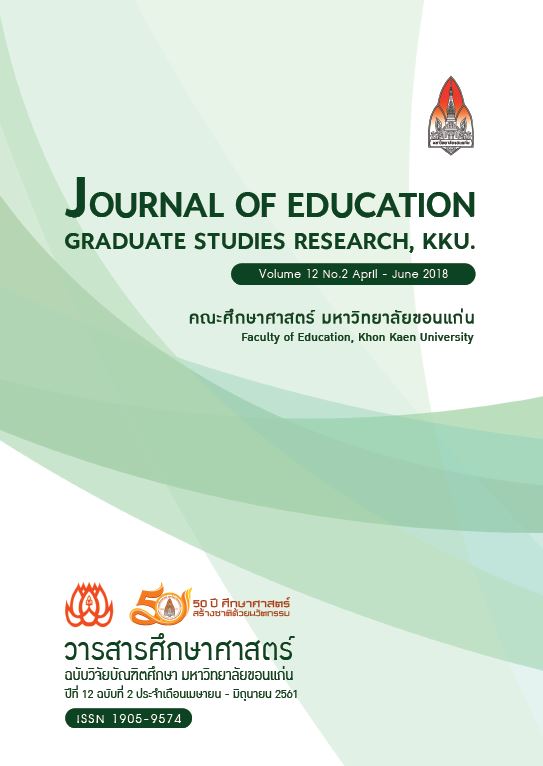A Structure Equation Model of Coaching Leadership Affecting the Teacher Efficiency of Teacher in the School under Khon Kean Provincial Administrative Organization
Main Article Content
Abstract
The objectives of this research were 1) to study the level of teaching leadership and teaching Efficiency of teachers in the school under Khon Kean Provincial Administrative Organization.2) investigate the congruence of A Structure Equation Model of Coaching Leadership Affecting the Teaching Efficiency of Teacher in the School under Khon Kean Provincial Administrative Organization with empirical data. This research is the Descriptive Research. The population in this study was 493 teachers in the school. Under the Khon Kaen Provincial Administration Organization, academic year 2016. The sample sizes were 360 people using the multi-stage sampling. Research tool was rating scale with reliability of 0.93. The data was analyzed in the forms of descriptive statistic and M-Plus program.
The results were as follows;
- The Coaching leadership level in the school under Khon Kean Provincial Organization was in the high level and the highest factor was the Positive feedback.
- The Teaching Efficiency level in the school under Khon Kean Provincial Organization was in the high level and the highest factor was the Lesson depth and clarity.
- The Structure Equation Model of Coaching Leadership Affecting the Teaching Efficiency of Teacher in the School under Khon Kean Provincial Administrative Organization was fit with empirical data.
Article Details
References
ดาวรุวรรณ ถวิลการ. (2558). SMART คุณลักษณะของผู้นำแห่งสังคมเปี่ยมสุขในศตวรรษที่ 21. วารสารศึกษาศาสตร์ ฉบับวิจัยบัณฑิตศึกษา มหาวิทยาลัยขอนแก่น. 9(1), 1-9.
พิมพ์วลัญช์ นันทัยทวีกุล. (2557). ภาวะผู้นำของการบริหารสถานศึกษาและพฤติกรรมการสอนของครูที่ส่งผลต่อประสิทธิภาพการสอนของครูในโรงเรียน สังกัดสำนักงานเขตพื้นที่การประถมศึกษาขอนแก่น เขต 5. วิทยานิพนธ์ปริญญาศึกษาศาสตรมหาบัณฑิต สาขาวิชาการบริหารการศึกษา บัณฑิตวิทยาลัย มหาวิทยาลัยขอนแก่น.
รินดา พูลสว่าง. (2557). ความสัมพันธ์ระหว่างภาวะผู้นำทางวิชาการของผู้บริหารสถานศึกษากับประสิทธิภาพการสอนของครูในสถานศึกษา สำนักงานเขตพื้นที่การศึกษามัธยมศึกษา เขต 3 นนทบุรี. วิทยานิพนธ์ศึกษาศาสตรมหาบัณฑิต สาขาวิชาการบริหารการศึกษา บัณฑิตวิทยาลัย มหาวิทยาลัยสุโขทัยธรรมาธิราช.
สันติ สิทธิจันดา. (2557). ภาวะผู้นำของผู้ฝึกสอนและความพึงพอใจของนักกีฬาที่มีความสัมพันธ์ต่อ พฤติกรรการเล่นและผลการแข่งขันฟุตบอลในการแข่งกีฬาเยาวชนแห่งชาติ ครั้งที่ 27. วิทยานิพนธ์ศึกษาศาสตรมหาบัณฑิต สาขาวิชาการบริหารการศึกษา สถาบันการพลศึกษา วิทยาเขตเพชรบูรณ์.
สถาบันทดสอบทางการศึกษาแห่งชาติ (องค์การมหาชน). (2557-2559). ผลการทดสอบทางการศึกษาแห่งชาติ ปี 2558. จาก www.niets.or.th
องค์การบริหารส่วนจังหวัดขอนแก่น. (2559). ข้อมูลสารสนเทศทางการศึกษา ปีการศึกษา 2557 -2559. ค้นเมื่อ 10 พฤศจิกายน 2559, จากเว็ปไซน์ http://www.kkpow.go.th
Gary D. Borich. (2015). Observation Skills for Effective Teaching.Ohio. Merrillb Publishing Company.
Chen, Ming-Hung. (2007). Exploring the Relationship between Effective Coaching Leadership, Group Cohesion, and Achivement Motivation in College Basketball Teams in Taiwan. Ph.D. Dissertation, Doctor of Sport Management, United States Sports Academy.
Hair, J., Black, W., Babin, B., Anderson, R., & Tatham, R. (2006). Multivariate data analysis (6th ed.). Upper saddle River, N.J. Pearson Prentice Hall.
Stewart Vella. (2010). The application of coach leadership model to coaching practice. Current state and future directions.
Faculty of Science, Medcide and Health. University of Wollongong. Australia.

